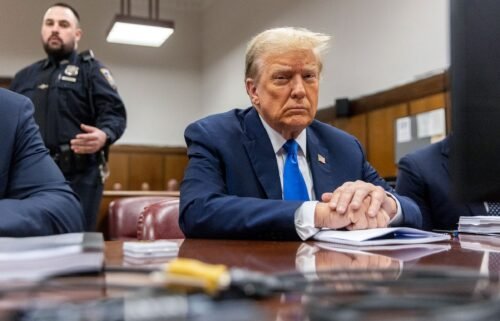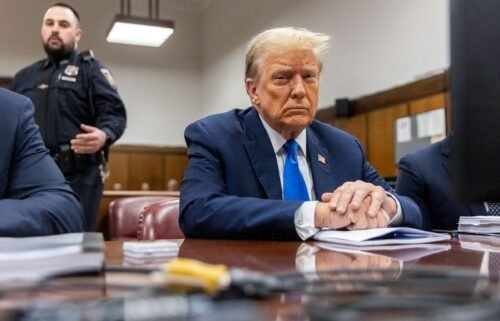With impeachment consuming Congress, lawmakers fear threat of a government shutdown

A government funding deadline is on a collision course with the Democratic impeachment inquiry, leaving lawmakers scrambling to find a way out of what could become a bitter and politically charged impasse.
Democratic and Republican members acknowledge a shutdown is far from desired. They are working to hammer out agreements on full-year spending bills and a short-term stopgap measure to keep the lights on beyond the November 21 funding deadline. But there are palpable concerns — combined with slow moving progress in the broader talks — that the tenor of impeachment could engulf the Capitol and make it harder for lawmakers to find time to pass legislation that would keep the government funded past the November deadline.
“That is one of the things that has me frankly very concerned,” said Rep. Mario Diaz-Balart, a Republican on the House Appropriations Committee. “The impeachment thing is clearly bringing us closer to the risk of a government shutdown. There is no doubt about it.”
House Majority Leader Steny Hoyer, a Maryland Democrat, urged his Senate colleagues to “take a meaningful step forward and work together with us to reach bipartisan agreement” on all 12 spending bills stuck in limbo, instead of passing another months-long continuing resolution, in a letter to Senate Majority Leader Mitch McConnell on Tuesday.
It’s a long way from the good will, and equally good vibes, that followed a sweeping last minute, two-year budget agreement in July, one that locked in increased funding for both domestic and defense priorities prized by lawmakers in both parties.
Yet the progress on the individual spending bills simply hasn’t followed. While House Democrats have moved most of their measures, largely along party lines, the Republican-controlled Senate, where bipartisan agreement is needed to move legislation forward, is still waiting to pass its first appropriations package on the floor. It’s a process beset by squabbles over top-line spending numbers, specific provisions each side calls objectionable and a feeling, at least according to one senator, that there is an “ongoing game of chicken” to see who will buckle first to finally get things on track.
Trump is the wild card
Veterans of spending wars — and the longest government shutdown in US history last year — in both parties make clear that there is still time to move forward, with possibly a short-term stopgap bill to provide the space to complete funding by the end of the year.
White House officials have given no indication up to this point that Trump is spoiling for a shutdown battle, people involved in the talks say. In a 27-page letter to top lawmakers on the Senate Appropriations panel obtained by CNN laying out the White House views of the appropriations bills drafted to that point, the administration reiterated its priorities, but didn’t draw the kinds of bright red lines that would foretell a future implosion.
Sen. Brian Schatz, a Democrat from Hawaii on the Appropriations panel, laid out two potential pathways for the process going forward, the optimistic and the pessimistic.
“Now that we have impeachment, the optimistic theory of the case is we’re going to fight about that, but we’re going to do our job on appropriations and maybe even in a counterintuitive way that creates the room,” Schatz told CNN. And the worst-case scenario? “This will cause Donald Trump to be even more unpredictable and dug in, and then it’s going to be very hard to make a deal.”
Members of both parties acknowledge Trump remains the ultimate wild card, and he has made clear that he’s unwilling to sign domestic spending measures until bills with Republican priorities, ranging from defense to border security, make their way to his desk as well.
“I’m increasingly worried that President Trump may want to shut down the government again because of impeachment,” Senate Minority Leader Chuck Schumer said during a news conference on Tuesday. “He always likes to create diversions. I hope and pray he won’t want to cause another government shutdown, because it might be a diversion away from impeachment.”
Senate Appropriations Chairman Richard Shelby, who has become a de-facto briefer-in-chief of Trump on all things appropriations over the last few years, said he “wouldn’t think so,” when asked if he was concerned impeachment would lead Trump to shut down the government. “I would hope not.”
But as the process, at the moment, remains beset by hurdles, the timing is inconvenient to say the least. It has become abundantly clear, lawmakers and aides say, that the House will still be in the throes of their impeachment inquiry when the funding deadline hits, potentially holding public hearings and moving closer to introducing their articles of impeachment.
Already, impeachment has become the center of the legislative focus on Capitol Hill with lawmakers and aides of the relevant committees: Foreign Affairs, Intelligence and Oversight wrapped up in day-long depositions almost every day of the week and other lawmakers constantly managing questions about the next step of the inquiry.
That has left Senate negotiators not just racing toward the November funding deadline, but also faced with the reality that once the House votes to impeach Trump, the all-consuming Senate trial that would follow will immediately land in their lap.
“Once it comes over to us, we don’t have any choice but to take it up and you can’t do anything else without consent and you know how hard that can be,” Sen. John Cornyn, a Texas Republican, told CNN. Asked if he was concerned about the funding deadline given the looming potential impeachment trial, he said flatly: “Yes. I am.”
Majority Leader Mitch McConnell made it clear to his Republican conference earlier this month that once an impeachment trial begins in the Senate, there will be little to no time on the floor for legislative business.
“I think whether it’s appropriations or anything else, all legislation is going to be impacted by the fact that you have six or seven House committees consumed by it, and in the Senate, if we go into a trial we’re going to spend every day for six days a week from one until whenever that day dealing with this,” said Sen. Marco Rubio, a Florida Republican.
Eying solutions for the end of the year or into February
Behind the scenes, discussions have centered around another continuing resolution that would fund the government into February, a date to get lawmakers through the holiday season jam-packed with impeachment proceedings. The biggest roadblock has been warnings from defense hawks that another continuing resolution would leave the military strapped and unable to plan for the future. A shorter continuing resolution, one that goes through the end of the year, could potentially give lawmakers the space to finalize most, if not all, of the funding measures, if the process gets on track soon. As it currently stands that remains a big if, according to aides.
McConnell, for his part, has chided Democrats for the lack of progress, attributing it to their focus on impeachment and, on the Senate floor, prodding them to prove they are willing to make good on their pledge to both investigate and legislate.
“Are all the declarations that they are willing to work on important legislation just empty talk?” McConnell asked last week.
Sen. Chuck Schumer, the Democratic leader, fired back that Republicans have been unwilling to negotiate on the necessary topline spending numbers and have been moving forward on bills without bipartisan sign off. He took a jab at McConnell’s long-since embraced nickname as well: “Democrats not interested in legislating? From the man who proudly calls himself the ‘Grim Reaper?'”
When lawmakers agreed to a two-month continuing resolution in September, the prospects for an impeachment inquiry were slim. The deal came together before a whistleblower complaint became public and before many of the frontline Democrats had come out in support of the inquiry.
While an impasse over the President’s border wall had forced them into the short-term spending bill in the first place, aides were optimistic they could find a way to negotiate at least some of the 12 appropriations bills in the intervening weeks. But aides and members say the President’s campaign promise of a border wall with Mexico, and the money taken from military construction problems to fund it through a national emergency mechanism, continues to stand in the way, and now impeachment has become a complicating factor.
“Most Republicans don’t want a (continuing resolution), certainly those who know anything about the Department of Defense don’t want a CR, and at this point they’ve got to decide how important their wall is,” Sen. Dick Durbin, a member of the Senate Appropriations Committee, told CNN.
Another ongoing risk of a shutdown is the President himself. Last winter, the President led a month-long, partial government shutdown that became the longest in history and some aides and lawmakers privately acknowledge that a frustrated Trump is a wild card.
“Nothing is going to get done without a Presidential signature,” said Rep. Tom Cole, a Republican from Oklahoma. “I don’t think the President will shut down the government, but the longer it goes, the CRs and no final agreement, it’s a risk you run.”



